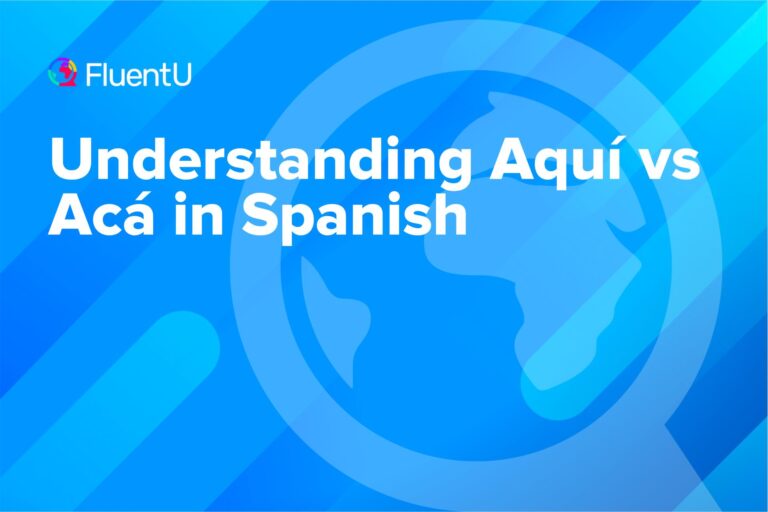Contents
- 1. Tomar el pelo
- 2. Ser pan comido
- 3. Estar como una cabra
- 4. No tener pelos en la lengua
- 5. Tirar la casa por la ventana
- 6. Quedarse de piedra
- 7. Lo dijo de labios para fuera
- 8. Estar hecho un ají
- 9. Empezar la casa por el tejado
- 10. Estar más sano que una pera
- 11. Tener un humor de perros
- 12. Se me hace agua la boca
- 13. Tiene más lana que un borrego
- 14. Echar agua al mar
- 15. Estar en la edad del pavo
- 16. Darle la vuelta a la tortilla
- 17. No hay color
- 18. Estar sin blanca
- 19. Llover a cántaros
- 20. Acostarse con las gallinas
- 21. Ser un ave nocturna
- 22. Ser como buscar una aguja en un pajar
- 23. Dar a luz
- 24. Estar en cueros
- 25. Despedirse a la francesa
- 26. No hay tutía
- Why Learn Spanish Idioms?
- And One More Thing…
26 Popular Spanish Idioms to Change Up Your Vocab

The Spanish language has a rich history, which has culminated in an array of idiomatic expressions that go beyond literal translations. If you’re aiming to sound more natural in Spanish—or just understand native speakers better—understanding these phrases can help elevate your fluency.
Here’s a curated list of popular Spanish idioms, their meanings and examples to help you integrate them into your conversations.
Download: This blog post is available as a convenient and portable PDF that you can take anywhere. Click here to get a copy. (Download)
1. Tomar el pelo
Meaning: To pull someone’s leg
“Tomar el pelo” literally means “to take the hair,” and is used when someone is tricking or making fun of someone else, but in a good-natured way. So if a friend tells you he won $10 million, you might say:
“Me estás tomando el pelo.” (You’re pulling my leg.)
2. Ser pan comido
Meaning: To be a piece of cake
The literal translation of “ser pan comido” is “to be bread eaten,” and it means that something is very easy to do. It’s the English equivalent of saying something is a piece of cake. For example:
“El trabajo es pan comido.” (The job is a piece of cake.)
3. Estar como una cabra
Meaning: To be a little crazy
“Estar como una cabra” is a commonly used Spanish idiom for when somebody is doing something bizarre or a little out of the ordinary. The literal translation is “to be like a goat,” and the English equivalent is saying someone is a little nuts or crazy:
“Esta noche estás como una cabra.” (Tonight you are a little crazy.)
4. No tener pelos en la lengua
Meaning: To be straightforward / To tell it like it is
The literal translation of “no tener pelos en la lengua” is “not to have hairs on your tongue.” This Spanish idiom means that someone is a straight shooter and will always speak their mind:
“Mi amigo no tiene pelos en la lengua.” (My friend tells it how it is.)
5. Tirar la casa por la ventana
Meaning: To spare no expense
“Tirar la casa por la ventana” is literally translated as “to throw the house through the window,” and it means that no expense has been spared or that money is no object:
“Tiré la casa por la ventana cuando compré mi nuevo coche.” (I spared no expense when I bought my new car.)
6. Quedarse de piedra
Meaning: To be stunned
“Quedarse de piedra” is literally to “stay like a stone,” and it means to be amazed. In other words, you’re so stunned by something that you stay like a stone:
“Me quedé de piedra cuando me dijo la historia.” (I was stunned when he told me the story.)
7. Lo dijo de labios para fuera
Meaning: To say something you didn’t mean
“Lo dijo de labios para fuera” is literally translated as “he said it from the lips outwards,” and it means that a person didn’t mean what they said:
“Lo dijo de labios para fuera cuando dijo que era culpable.” (He didn’t mean it when he said he was guilty.)
8. Estar hecho un ají
Meaning: To be very angry
“Estar hecho un ají” is literally translated as “to be made a chili,” and it means to be very angry about something:
“No le gustó el resultado. Está hecho un ají.” (He didn’t like the outcome. He’s very angry.)
9. Empezar la casa por el tejado
Meaning: To put the cart before the horse
“Empezar la casa por el tejado” is literally “to start the house by the roof,” and it means to put the cart before the horse, or to have things in the wrong order:
“Si empezáramos la construcción sin los fondos, estaríamos empezando la casa por el tejado.” (If we started construction without the funds, we’d be putting the cart before the horse.)
10. Estar más sano que una pera
Meaning: To be fit as a fiddle
“Estar más sano que una pera” is literally translated as “to be healthier than a pear.” The English equivalent is to be as fit as a fiddle, and it means that someone feels great and is very healthy:
“Mi abuela tiene 85 años, pero está más sana que una pera.” (My grandmother is 85, but she’s as fit as a fiddle.)
11. Tener un humor de perros
Meaning: To be in a bad mood
“Tenemos un humor de perros” is literally translated as “to have a mood of dogs,” and it means to be in a bad mood:
“Ellos tienen un humor de perros porque no aprobaron los exámenes en la universidad.” (They’re in a bad mood because they didn’t pass their exams at the university.)
12. Se me hace agua la boca
Meaning: To make one’s mouth water / To be mouthwatering
“Se me hace agua la boca” is a common Spanish idiom translated as “it makes my mouth water,” meaning that an item of food or a meal is so delicious it makes the saliva flow in a person’s mouth:
Se me hace agua la boca solo pensar en la paella.” (It makes my mouth water just thinking about paella.)
13. Tiene más lana que un borrego
Meaning: To be loaded [with cash]
“Tiene más lana que un borrego” translates as “he has more wool than a lamb,” and it means that a person is loaded with cash:
“Él pagó la cuenta en el restaurante porque tiene más lana que un borrego”. (He paid the bill in the restaurant because he’s loaded with cash.)
14. Echar agua al mar
Meaning: To do something pointless / To put a drop in the bucket
“Echar agua al mar” is literally translated as “to throw water into the sea,” a Spanish idiom used in some Spanish-speaking regions to mean that something is pointless:
“Tratar de convencerla es como echar agua al mar. Ella nunca va a cambiar.” (Trying to convince her is pointless. She’s never going to change.)
15. Estar en la edad del pavo
Meaning: To be at that awkward age
This literally means “to be in the age of the turkey,” which fits the idiomatic meaning perfectly since it’s used to say “at that awkward age:”
Miguel, tienes 35 años ya, deja de hacer el tonto. ¡Ya no estás en la edad del pavo! — Miguel, you are 35 already, stop playing the fool. You are not at that awkward age any more!
16. Darle la vuelta a la tortilla
Meaning: To turn the tide
While you can flip a tortilla while cooking, this phrase can also refer to turning the tide:
Íbamos perdiendo, pero le dimos la vuelta a la tortilla y al final ganamos. — We were losing, but we turned the tide and ended up winning.
17. No hay color
Meaning: There is no comparison
This literally means “there is no color,” but it is really saying that something cannot compare:
Mi coche es mucho más rápido que el tuyo. ¡No hay color! — My car is much faster than yours. There’s no comparison!
18. Estar sin blanca
Meaning: To be broke
This literally translated to “be without white,” but blanca was actually a Spanish coin in the 16th century, so this phrase is really used to say that you don’t have any money:
He gastado todos mis ahorros para comprar un coche y ahora estoy sin blanca. — I have spent all my savings to buy a car and now I am penniless.
19. Llover a cántaros
Meaning: To rain cats and dogs
Literal translation: to rain to pitchers
English meaning: to rain cats and dogs
This literally means “to rain to pitchers,” but is more easily understood as “it’s raining cats and dogs.”
Estaba lloviendo a cántaros, así que no fuimos al concierto. — It was raining cats and dogs, so we didn’t go to the concert.
20. Acostarse con las gallinas
Meaning: To go to bed early
This literally means “to go to bed with the hens” but refers to someone going to bed very early:
Son las 4 de la tarde y ya estás cansado. Me parece que hoy te vas a acostar con las gallinas. — It’s 4 p.m. and you’re already tired. I think you’ll be going to bed very early today.
21. Ser un ave nocturna
Meaning: To be a night owl
While this one technically means “to be a night bird,” you can probably catch on that this is the same as a “night owl” in English:
Me gusta estudiar por la noche. Soy un ave nocturna. — I like studying at night. I am a night owl.
22. Ser como buscar una aguja en un pajar
Meaning: To be like looking for a needle in a haystack
Literal translation: to be like looking for a needle in a straw loft
English meaning: to be like looking for a needle in a haystack
This expression translates almost directly into “be like looking for a needle in a haystack.”
Hay unas 2.000 personas aquí. Encontrar a María va a ser como buscar una aguja en un pajar. — There are around 2,000 people in here. Finding María is going to be like looking for a needle in a haystack.
23. Dar a luz
Meaning: To give birth
Literal translation: to give to light
English meaning: to give birth
This is a fun expression as it literally means “to give to light,” but is actually used to say someone is giving birth:
Lucía dio a luz a su segundo hijo hace unas horas. — Lucía gave birth to her second child a few hours ago.
24. Estar en cueros
Meaning: To be naked
Literal translation: to be in leathers/in skins
English meaning: to be naked
Spanish speakers use this to say “to be naked,” although it literally means “to be in leathers.”
Juan siempre está en cueros. — Juan is always naked.
25. Despedirse a la francesa
Meaning: To take a French exit
This literally means “to say goodbye like the French” but is otherwise known as the “French exit,” or when you leave without saying goodbye. You might have heard of an Irish goodbye — that’s the same thing.
Pepe se ha despedido a la francesa y ahora tengo que pagar toda la cuenta. — Pepe has taken the French Exit and now I have to pay the whole bill.
26. No hay tutía
Meaning: No way
Literal translation: there is no solution, there is no remedy
English meaning: no way, not gonna happen, forget about it, no dice, nothing doing
No irás a la fiesta, ¡no hay tutía! — You will not go to the party. No way!
Why Learn Spanish Idioms?
Idioms are essential for speaking a language like a native, and Spanish is no exception.
There are hundreds of Spanish idioms, and while some are common to many Spanish language speakers, others are only used in one or a handful of countries in the Spanish-speaking world. There are even idioms that are only spoken in specific regions.
To hear lots of idiomatic and regional Spanish being used in real life, you can use an immersive language program like FluentU.
FluentU takes authentic videos—like music videos, movie trailers, news and inspiring talks—and turns them into personalized language learning lessons.
You can try FluentU for free for 2 weeks. Check out the website or download the iOS app or Android app.
P.S. Click here to take advantage of our current sale! (Expires at the end of this month)

Now that you know some of the most popular Spanish idioms, you’ll be well on your way to sounding more fluent!
Download: This blog post is available as a convenient and portable PDF that you can take anywhere. Click here to get a copy. (Download)
And One More Thing…
If you've made it this far that means you probably enjoy learning Spanish with engaging material and will then love FluentU.
Other sites use scripted content. FluentU uses a natural approach that helps you ease into the Spanish language and culture over time. You’ll learn Spanish as it’s actually spoken by real people.
FluentU has a wide variety of videos, as you can see here:

FluentU brings native videos within reach with interactive transcripts. You can tap on any word to look it up instantly. Every definition has examples that have been written to help you understand how the word is used. If you see an interesting word you don’t know, you can add it to a vocab list.

Review a complete interactive transcript under the Dialogue tab, and find words and phrases listed under Vocab.

Learn all the vocabulary in any video with FluentU’s robust learning engine. Swipe left or right to see more examples of the word you’re on.

The best part is that FluentU keeps track of the vocabulary that you’re learning, and gives you extra practice with difficult words. It'll even remind you when it’s time to review what you’ve learned. Every learner has a truly personalized experience, even if they’re learning with the same video.
Start using the FluentU website on your computer or tablet or, better yet, download the FluentU app from the iTunes or Google Play store. Click here to take advantage of our current sale! (Expires at the end of this month.)
































